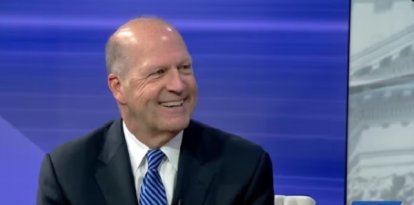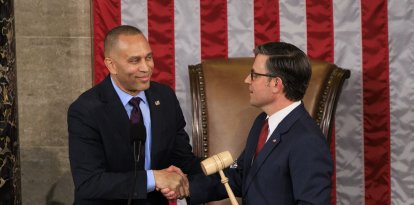ANALYSIS
Clarence Thomas, 'master class' against the 'expert class': 'American people and their representatives are entitled to disagree with those who hold themselves out as experts'
The Supreme Court justice lashed out at several of the previous administration's arguments in favor of trans treatments for minors, such as "medical consensus" and children's consent.

Clarence Thomas (center) at Trump's inauguration.
Clarence Thomas concurred "in full" with the Supreme Court majority that on Wednesday ratified a Tennessee law against trans treatment of minors. He did add, however, in 23 pages accompanying the ruling, words of his own to those of John Roberts, drafter of the victorious opinion, to "address some additional arguments."
"This case carries a simple lesson: In politically contentious debates over matters shrouded in scientific uncertainty, courts should not assume that self-described experts are correct," the conservative justice wrote. He went on to write evidence that, in his eyes, supports this skepticism:
"Many prominent medical professionals have declared a consensus around the efficacy of treating children’s gender dysphoria with puberty blockers, cross-sex hormones, and surgical interventions, despite mounting evidence to the contrary."
"They have dismissed grave problems undercutting the assumption that young children can consent to irreversible treatments that may deprive them of their ability to eventually produce children of their own."
"They have built their medical determinations on concededly weak evidence. And, they have surreptitiously compromised their medical recommendations to achieve political ends."

Society
Federal judge extends her block on a Trump policy that banned self-identifying as transgender or non-binary on passports
Emmanuel Alejandro Rondón
In such matters of "medical uncertainty," but "extraordinary importance," the power of decision belongs to the people, their elected representatives and the democratic process, he asserts. "Sovereign prerogative," which, he says, "does not bow to 'major medical organizations.'”
"Taken together, this case serves as a useful reminder that the American people and their representatives are entitled to disagree with those who hold themselves out as experts," he reflects. And that courts cannot take the place of Legislatures. "The Court reserves to the people of Tennessee the right to decide for themselves."
Sonia Sotomayor, against Thomas, with the experts
"Indeed, even Judge Thomas seems to recognize that some scientific and medical evidence (at least that which is consistent with his view of the merits) is relevant," she adds.
The progressive judge was one of three who voted in the minority. "In sadness, I dissent," she wrote after asserting that the ruling amounted to "state-sanctioned discrimination."
Medical consensus?
Thomas questions not only the self-determined experts, but also the existence of a medical consensus on trans treatments for children. An argument wielded by the Biden Administration to defend its attempt to strike down the Tennessee law.
"There are several problems with appealing and deferring to the authority of the expert class," he contends, listing among others that "there is no medical consensus on how best to treat gender dysphoria in children."
"The treatments at issue are subject to a rapidly evolving debate that demonstrates a lack of medical consensus over their risks and benefits," he adds. It is "untenable" to claim that there is such professional commonality in favor of treatments in minors.
He further asserts that "medical professionals have increasingly expressed doubts over the quality of evidence supporting the use of puberty blockers, cross-sex hormones, and surgery."
"Over the past several years, public health authorities in different countries have concluded that these sex-transition treatments are experimental in practice, and that the evidence supporting their use is of ‘very low certainty,’ ‘insufficient,’ and ‘inconclusive,’" he adds.
Gender affirming... care?
He then proceeds to a listing of the treatments included in the law and their possible complications:
- Puberty blockers: He writes that the absence of studies on long-term effects "is a 'major drawback' in assessing the effects," and that, at the same time, "It is undisputed [...] that these treatments carry risks" such as decreased bone density and adverse effects on brain development. Nor is it clear, he adds, that they are "‘fully reversible."
- Cross-sex hormones: he lists a number of possible conditions such as loss of fertility, hyperandrogenism, irreversible changes in the vocal cords, ovarian and breast cancer....
- Surgeries: "These surgical interventions are irreversible, entail significant complications, and, in some cases, result in permanent infertility."
Can minors give their consent?
For a medical intervention to be ethical, he assures, the patient's consent is essential. "Notwithstanding the alleged experts' view that young children can provide informed consent," the final decision is in the hands of the states.
The latter, "could reasonably conclude that the level of young children’s cognitive and emotional development inhibits their ability to consent to sex-transition treatments."
"Consider the contents of a consent form obtained from a gender clinic in Alabama. After providing a long list of potential risks and side effects [...] the form requires both the child and parent to initial their consent to various statements. Among these are acknowledgments that “the side effects and safety of these medicines are not completely known,” that the proposed treatment “may affect my sex life in different ways and future ability to cause a pregnancy,” and that the treatments may lead to permanent infertility. The capacity to knowingly consent to these medical interventions requires a level of comprehension about science, sex, and fertility that state legislatures could determine a child is unlikely to possess."
To this evidence, Thomas adds the case of detransitioners: young people and adults regretting their trans treatments. "Voices" that, he says, "provide States with an additional reason to question whether children are providing informed consent." And again it comes back to Alabama:
"Alabama presented evidence from many detransitioners who uniformly testified that they were not aware of the long-term impacts of the treatments they underwent."
Political interests
Thomas' final argument for questioning the testimony of the "expert class" is that "recent revelations suggest that leading voices in this area have relied on questionable evidence, and have allowed ideology to influence their medical guidance."
Specifically, he takes aim at the World Professional Association for Transgender Health (WPATH), "long considered a standard bearer in treating pediatric gender dysphoria." New evidence suggests, he notes, that it "bases its guidance on insufficient evidence and allows politics to influence its medical conclusions."
"Worse, recent reporting has exposed that WPATH changed its medical guidance to accommodate external political pressure," he adds. Pressure, he says, from the Biden Administration: the organization reportedly agreed to remove age minimums for surgeries in its recommendations after receiving intimidation from the White House.


























